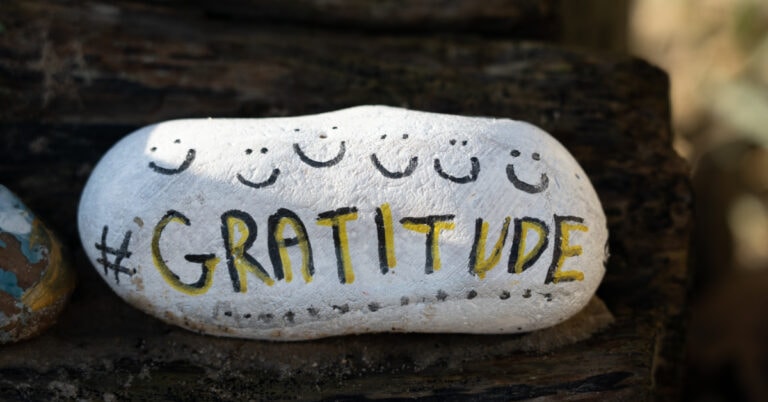Triggered: Practical Exercises for Self-Regulation
by Andrew Florence
by Lina Pasquale

The Merriam-Webster dictionary defines the following “attitude” and “gratitude” as follows:
I recently participated in a live webinar with the leading expert on gratitude, Dr. Robert Emmons. The webinar was a closed session for a cohort of positive psychology wellness coaches. During the webinar we were asked to reflect on the word gratitude. We were to share the thoughts, feelings, or sensations that arise when we think of the word. The chat box was rapidly firing off words such as appreciation, grateful, thankful, acknowledgement, recognition, joy, happiness, validation, love, calmness, etc. Almost all of the 30 participants responded. I typed a response and deleted it. Re-typed a response and deleted it again. I typed it one more time and deleted it once again. Strike 3. I was out.

I was not feeling particularly grateful that evening nor was I focused on seeing the good. I had received unpleasant news earlier that day that negatively impacted me. In truth, it put me in a state of ingratitude. As much as I tried, I could not conjure any positive thoughts or feelings associated with gratitude. Everything I typed in that chat box didn’t feel quite right or authentic. My attitude going into this webinar was primed by the negativity bias from the get-go, the tendency to give more weight and importance to negative experiences or feelings than positive ones.
There were many good things that occurred that day. Yet all I could think about and ruminate on was this one unpleasant thing. Right before Dr. Emmons was about to transition to his next point, I pushed myself. I typed one last response. And this I time submitted it in the chat box for all to read: “The action of recognizing the good.” In the notepad next to me I scribbled, “When my attitude permits me to do so.”

As Dr. Emmons continued, he shared his definition of gratitude: “A felt sense of wonder, thankfulness and appreciation for life.” He shared that gratitude includes both an affirmation of goodness and recognizing where that goodness comes from. It involves “a humble dependence on others”. I quickly realized that the only way I was going to get out of this rut was to push past the negativity bias and shift my mindset, behavior and overall attitude towards goodness. And then I had to take it a step further and recognize the source of that goodness. I needed to choose an attitude of gratitude, rather than view it as a challenge. I had to make an effort. You should also and here’s why.
Cultivating an attitude of gratitude does, in fact, take effort and choice. Yet it doesn’t have to be overwhelming or all consuming. Some proven methods include writing meaningful thank you notes, keeping a gratitude journal , counting daily blessings, practicing guided gratitude meditations, engaging in gratitude rituals with family, friends, and partners, utilizing gratitude apps, and taking in the beauty and bounty of nature.

When you’re having a tough day, ask yourself, “What’s NOT wrong?” This practice, from Thich Nhat Hanh, helps you affirm the good in your life even during difficult times. This will also help safeguard you from the forces of the negativity bias. No matter the situation, try to pause for a moment and consider what’s not wrong. If you can, jot down a few things on paper. When you practice gratitude and continue to establish a routine you will notice even more things to be grateful for overtime.
Whatever the format, gratitude research has shown that individuals who have a consistent practice of affirming the good and recognizing where it comes from, experience a host of positive benefits on their physical and psychological health, well-being, and social connections. It turns out that gratitude is really good for our brainsand choosing an attitude of gratitude leads to greater happiness.

Cultivating gratitude takes time and intention, yet the benefits are clear. Choose an attitude of gratitude. By doing so, you are investing in your own health, well-being and happiness.
Get started today:
What are three good things you can affirm?
What is the source of that goodness?
What’s not wrong?
Repeat tomorrow.